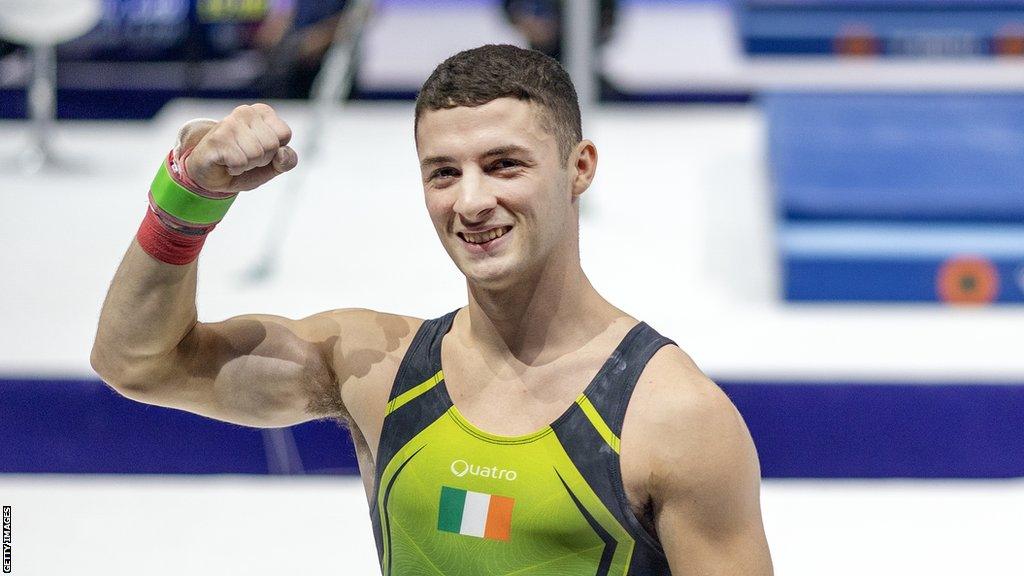'I didn't want to compete. I didn't want to be there' - Rhys McClenaghan on prioritising mental wellbeing
- Published

McClenaghan won his second world title earlier this month
Warning: This article contains references to mental health issues
When we watch athletes at the top of their game on television, it is easy to think they have the world at their feet.
The TV captures the moments of exhilaration and deflation that are part and parcel of elite sport.
Away from the cameras, though, athletes naturally feel more comfortable showing their vulnerabilities.
In September, gymnast Rhys McClenaghan, one of Northern Ireland's most successful athletes, was competing at the Apparatus World Cup in the Bercy Arena in Paris, the venue for next summer's Olympic Games.
The Newtownards native was facing, for the first time since the Tokyo Olympics pommel horse final, Max Whitlock, the double Olympic champion who was returning to action after taking a break from the sport.
Both men produced outstanding routines in the final with Whitlock's higher degree of difficulty ultimately edging it in his favour.
The normally smiling and vibrant McClenaghan looked disgusted. Was it with his own performance? Was it the fact he'd been beaten by Whitlock?
Neither was the case, as it turned out.
'I was in a state of panic really'
Rhys McClenaghan on his mental wellbeing
"It was a challenging build-up in the gym and then when it came to the competition in Paris a couple of weeks out from the World Championships, I think that all of the emotions I'd maybe bottled up in the training gym had just started to overflow in that competition, in that stressful situation," explains McClenaghan, 24.
"It was the first time in my career that I didn't want to compete, which was startling I think. I didn't want to be there. Even before I started my warm-up for the competition, my eyes were welling up with tears.
"I was sweating already. I was in a state of panic really, and you know, no matter how well that pommel horse routine went I wouldn't have cracked a smile on my face because I was just so startled by those panic-stricken emotions that I had."
Coming to terms with the mental health side of sport was something McClenaghan quickly began to deal with.
"I should have opened up more," he admits.
"I should have communicated with my coach more, communicated with the team around me a bit more and I think that it was just emotions bottled up that were overflowing on that competition day."
As he began his final preparations for the World Championships in Antwerp at the beginning of October, all media events involving McClenaghan were cancelled.
This was highly unusual for one of the most media-friendly athletes in Ireland who understands his role as an ambassador for his sport.
Even more unusual was the inactivity on his social media accounts. McClenaghan uses social media to communicate with his extensive following of young fans. He chronicles his journey and is highly engaging.
Was the pressure of being the defending world champion getting to him?
"The focus actually switched from my gymnastics to my mental wellbeing.
"Every day I woke up when I was in Belgium preparing for World Championships, I was thinking and asking myself how am I feeling and that was the main priority when I was there.
"It was strange and it was definitely a big change because I've never done a competition build-up without any social media, so it was different, but I feel like it was needed. I wanted full focus on my gymnastics but also and most importantly my mental wellbeing."
McClenaghan's new approach produced the desired result as he claimed his second world title, beating Whitlock amongst others to clinch his place for the Paris Olympics next summer.
Whitlock also spoke about his own mental health issues during his break from the sport after Tokyo, while Simone Biles, who struggled at the Tokyo Olympics, returned to action at the Worlds in Antwerp, where she became the most decorated gymnast in history.
Max Whitlock: Three-time Olympic champion feared failure after Tokyo 2020 Olympics
"There's a reason why millions of people tune into sport. To gain inspiration is one of those reasons," adds McClenaghan.
"There's a reason that people can translate sport into real life as well. And I think sharing those stories and those battles behind the scenes is very representative of life in general.
"And I think that's why people love a comeback story. That's what people love to hear. The battles behind the scenes because they can relate it to their lives. And it's not only athletes that feel these struggles. It's everybody who feels these struggles in some form.
"So to see somebody pushing through hard times and coming out the other side and being rewarded for it, of course in sport that's a medal around your neck. But in life when you push through those hard times you're also going to get rewarded for it in your own individual way. And I think that's why sport is so beautiful to watch.
"Well this is just part of my journey. And that's why I do these interviews. It's to share my story, to share my journey. Everybody would be bored if I just talked about the technicalities of my performance.
"As I said, it translates into life outside of sports. These struggles are universal. And if I don't share those struggles then I don't get the most out of this role. This role of responsibility that I don't take lightly, where I can be in a position to inspire anybody that's watching."
If you have been affected by any of the issues in this article, you can find details of organisations that can help via the BBC Action Line